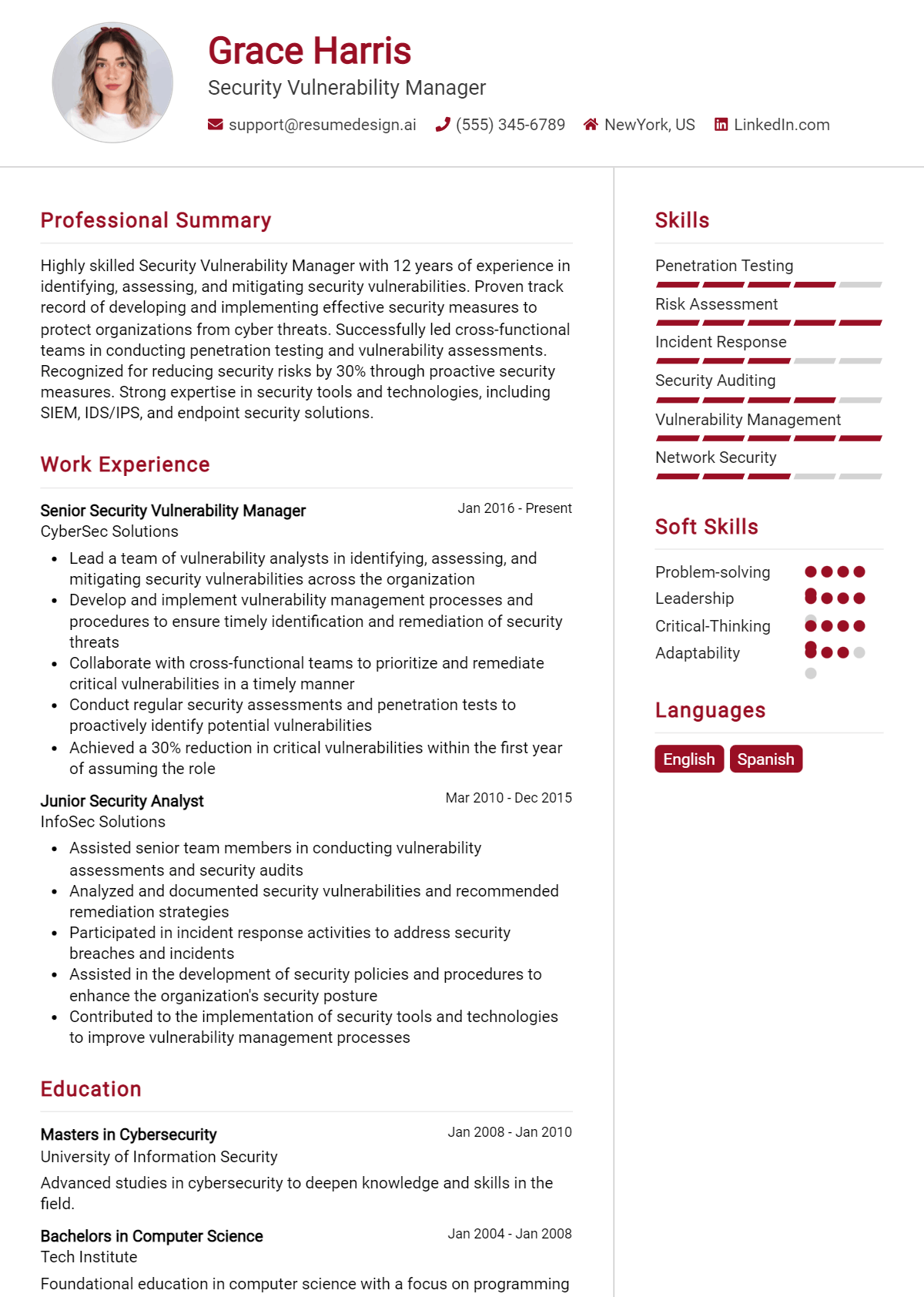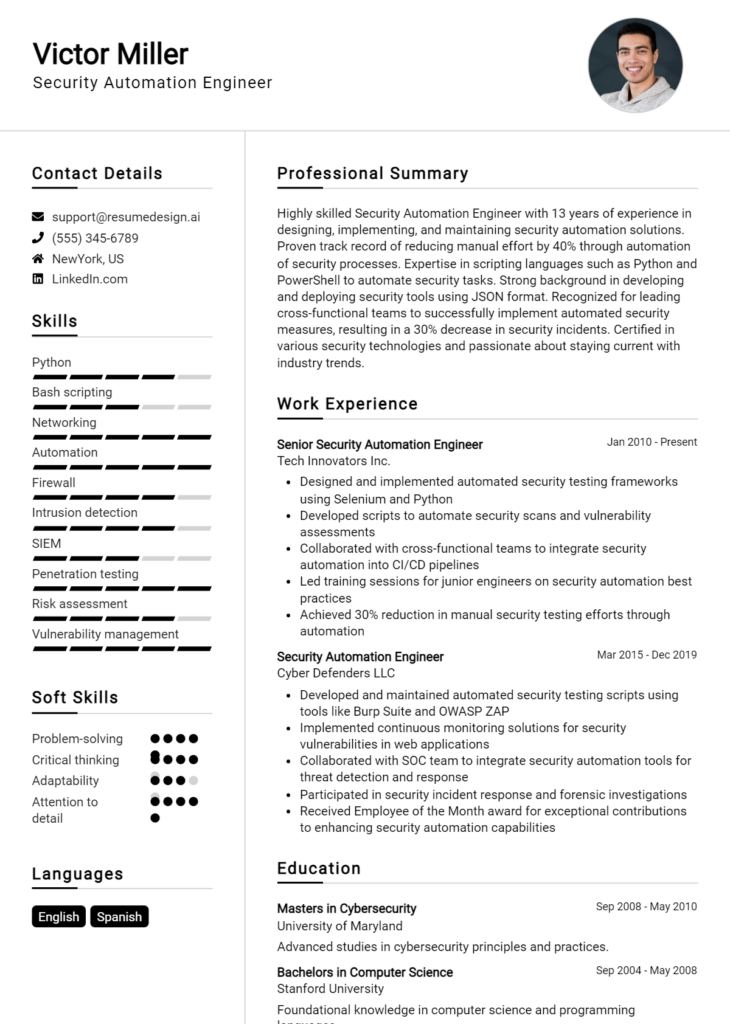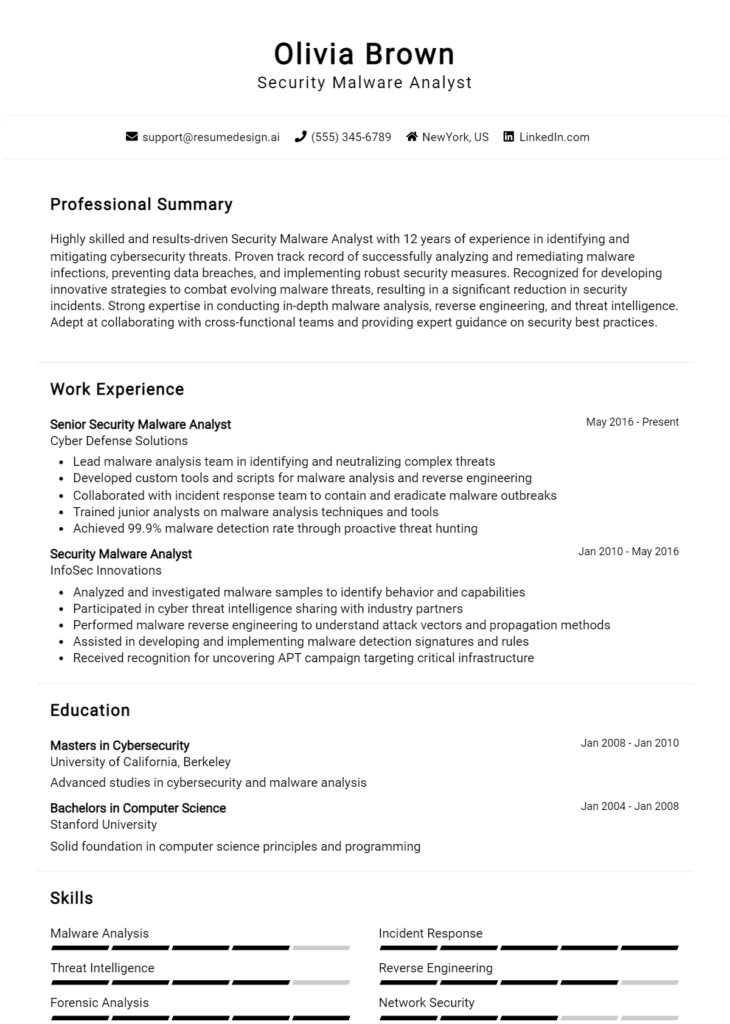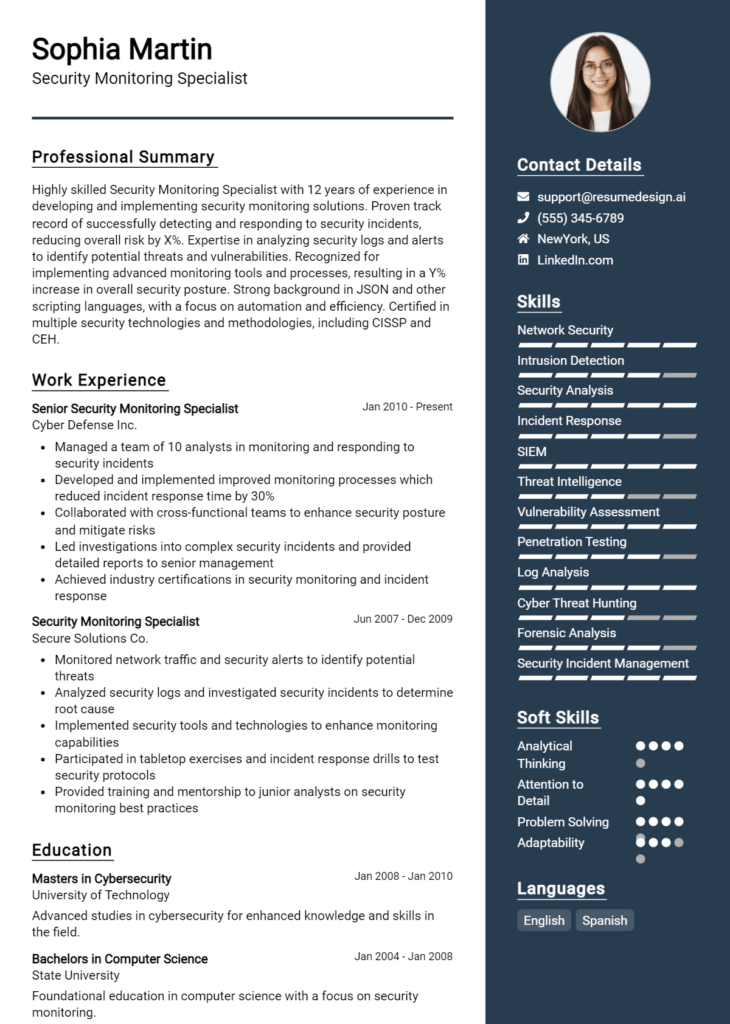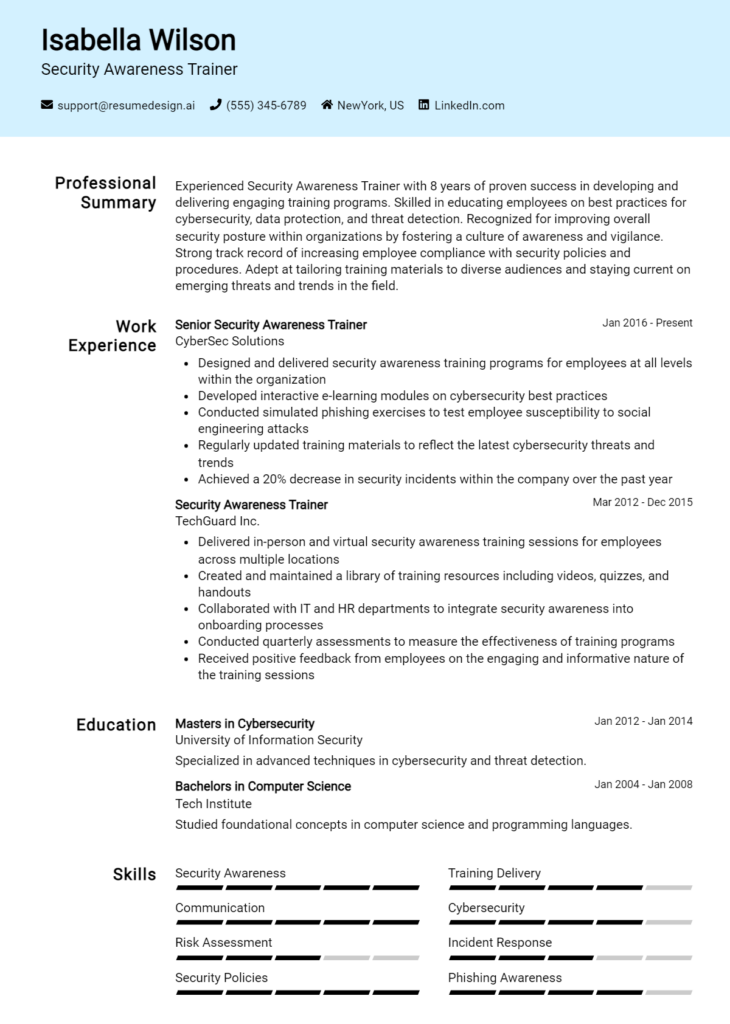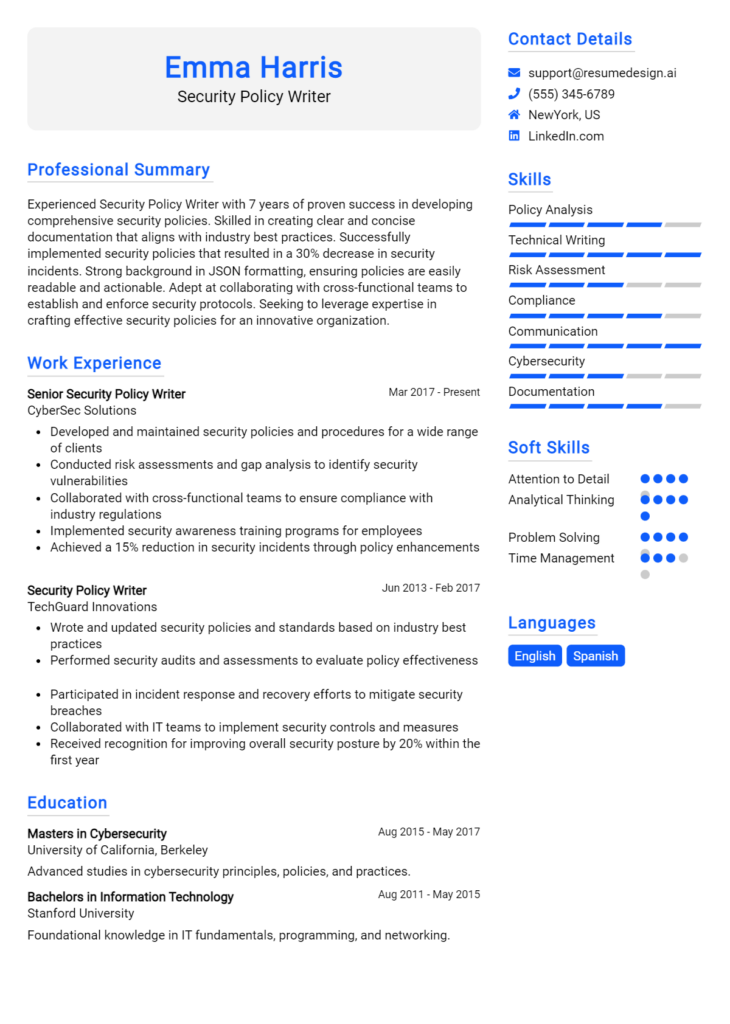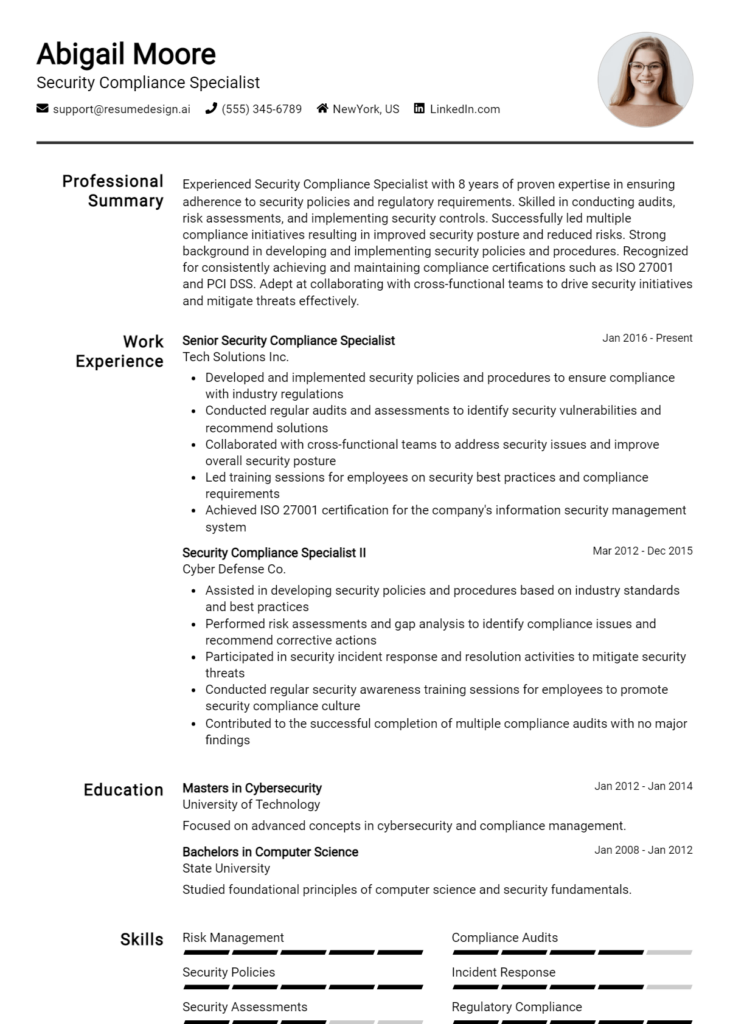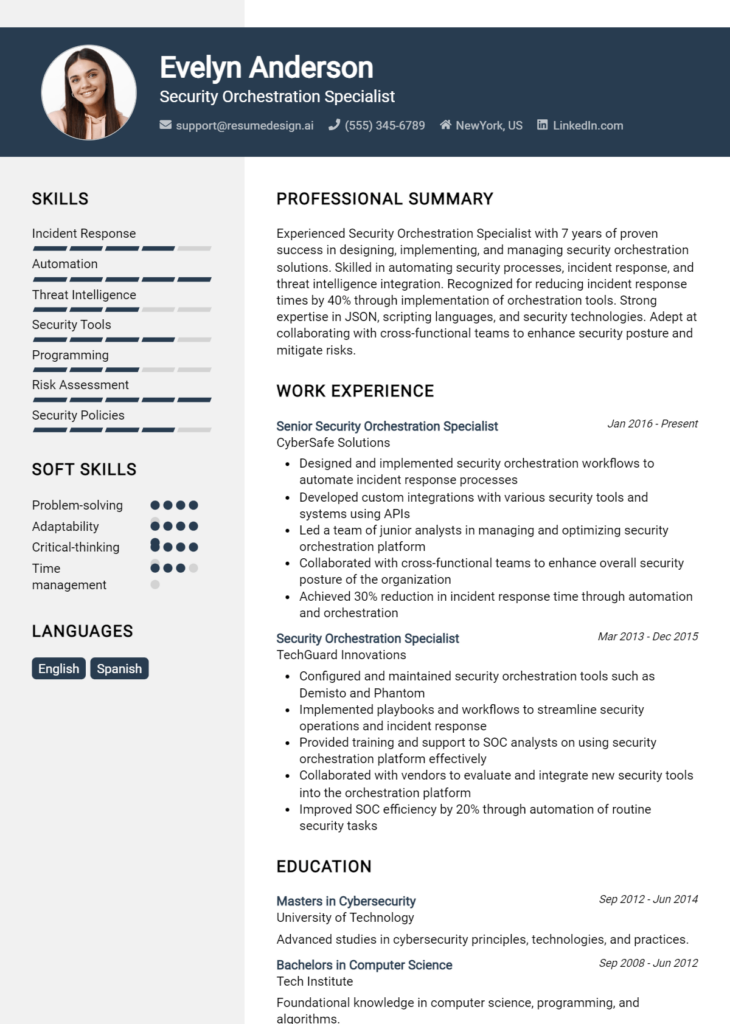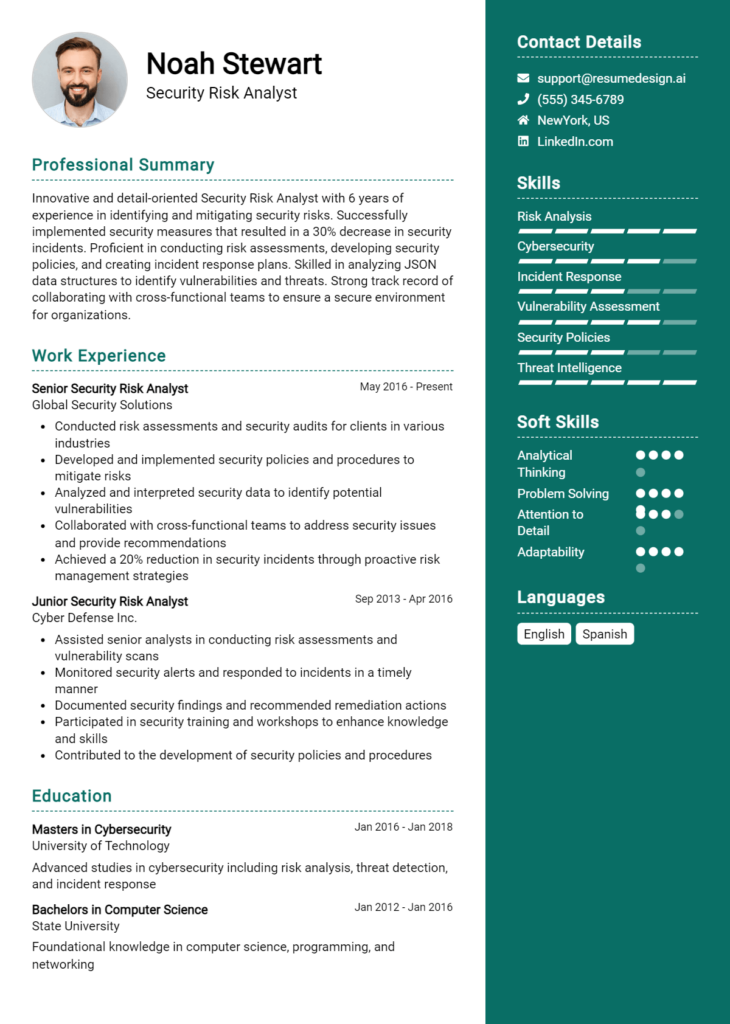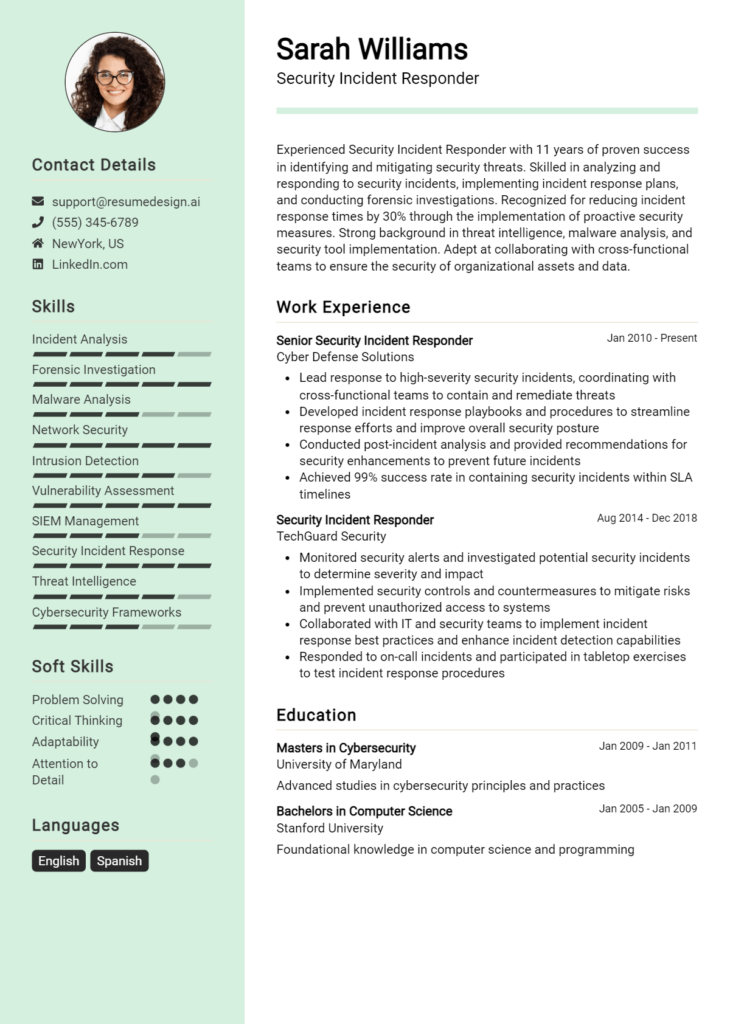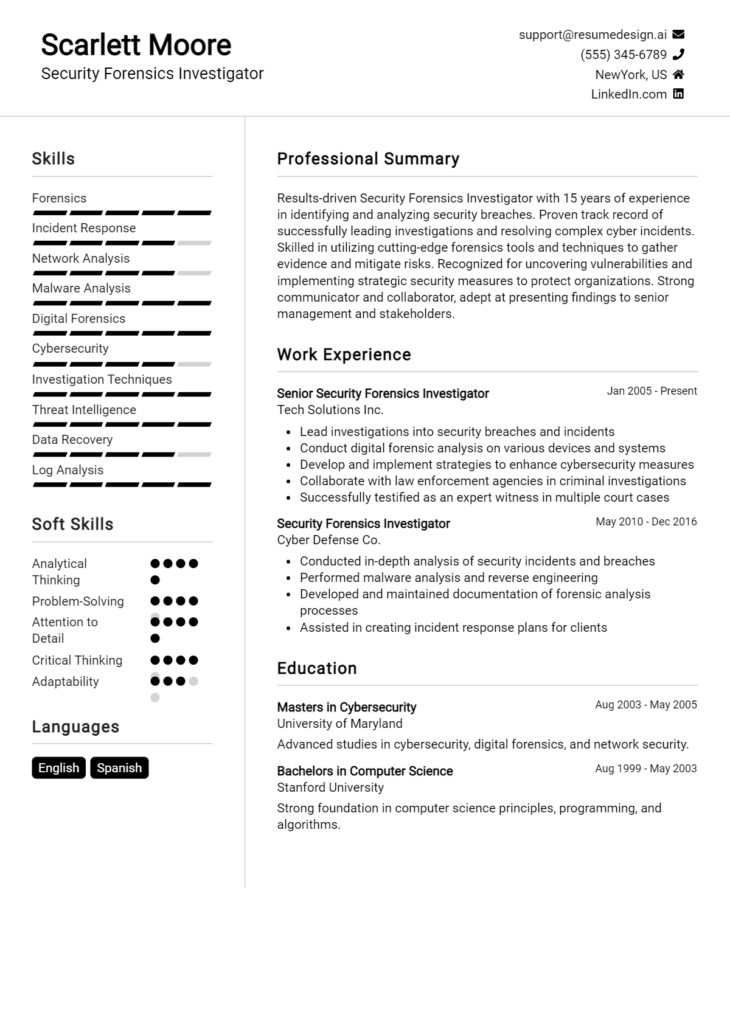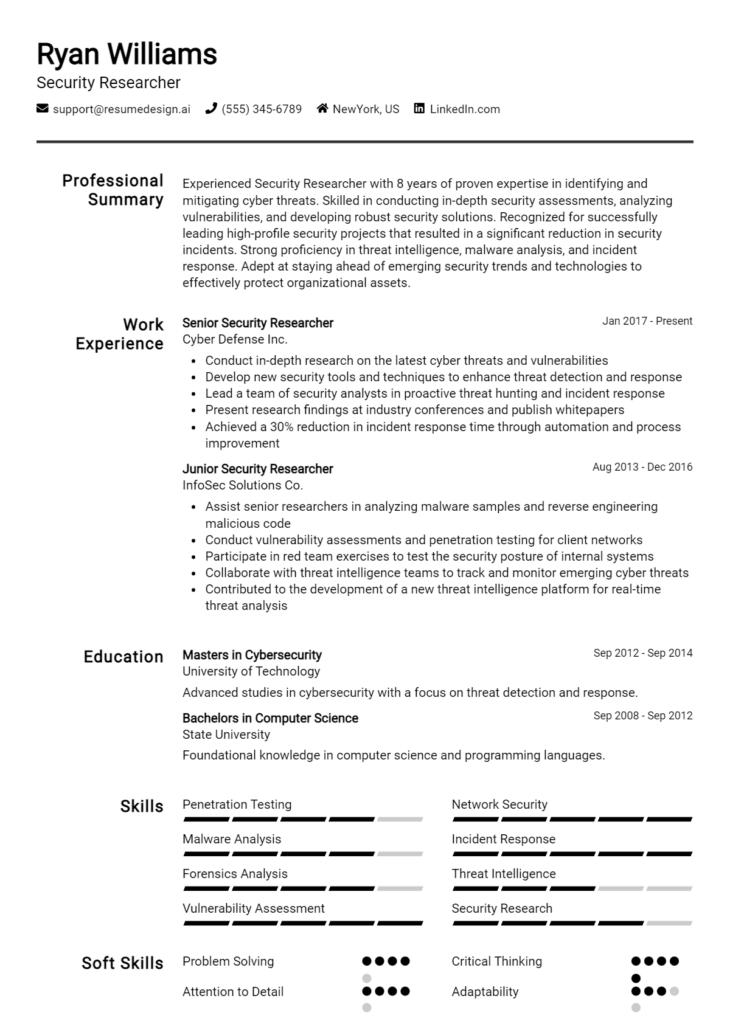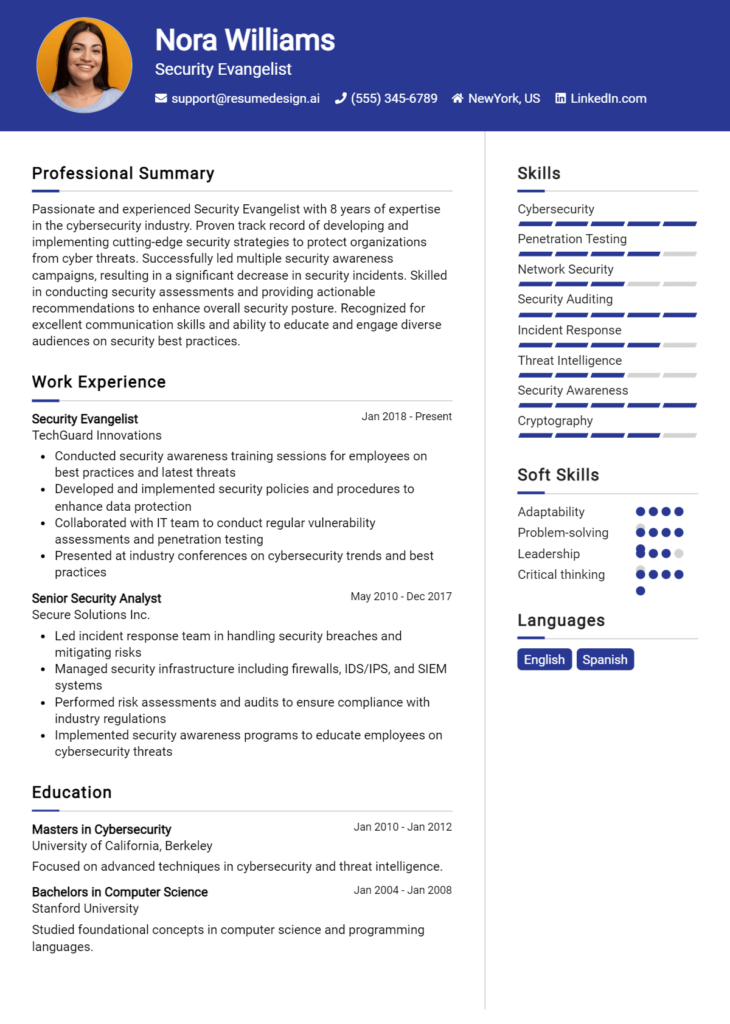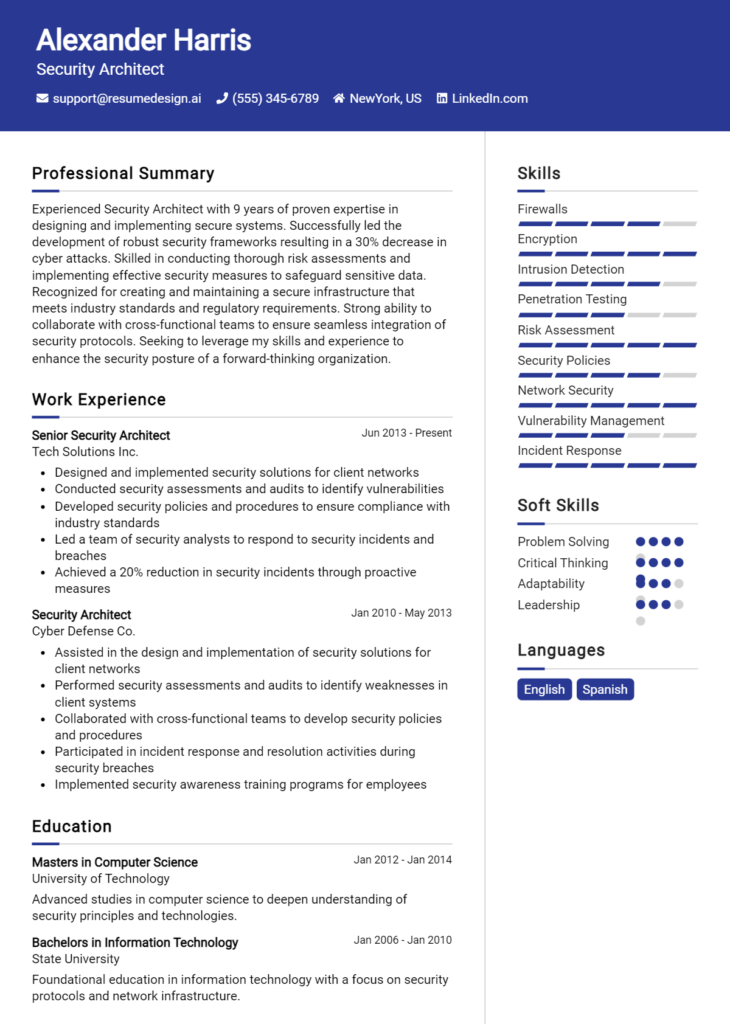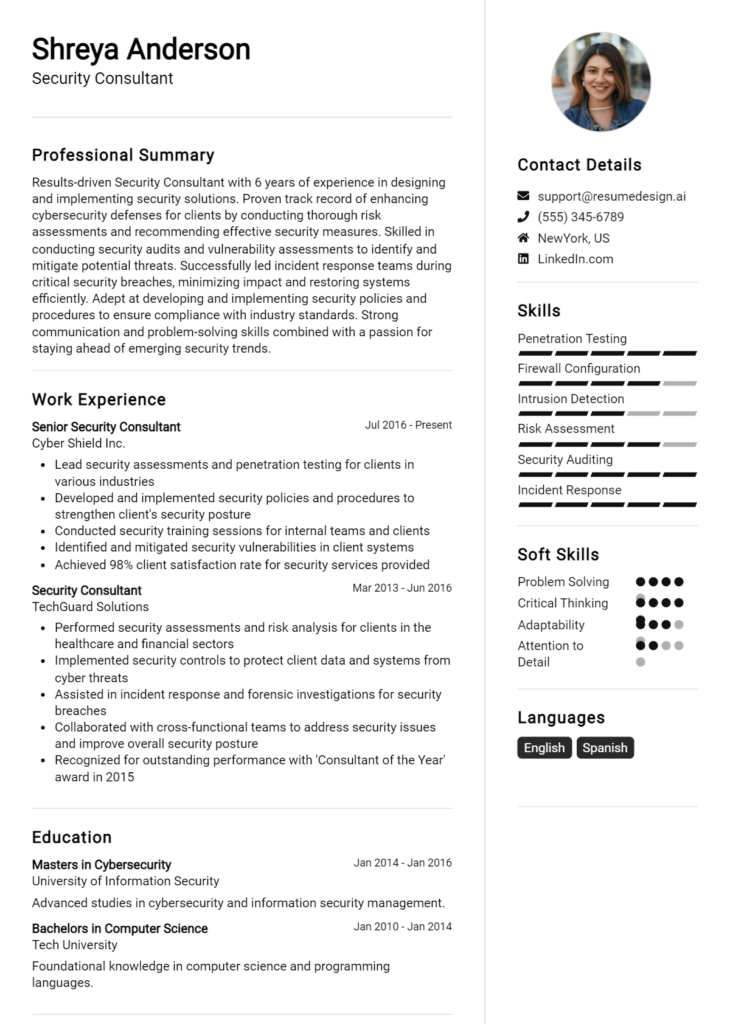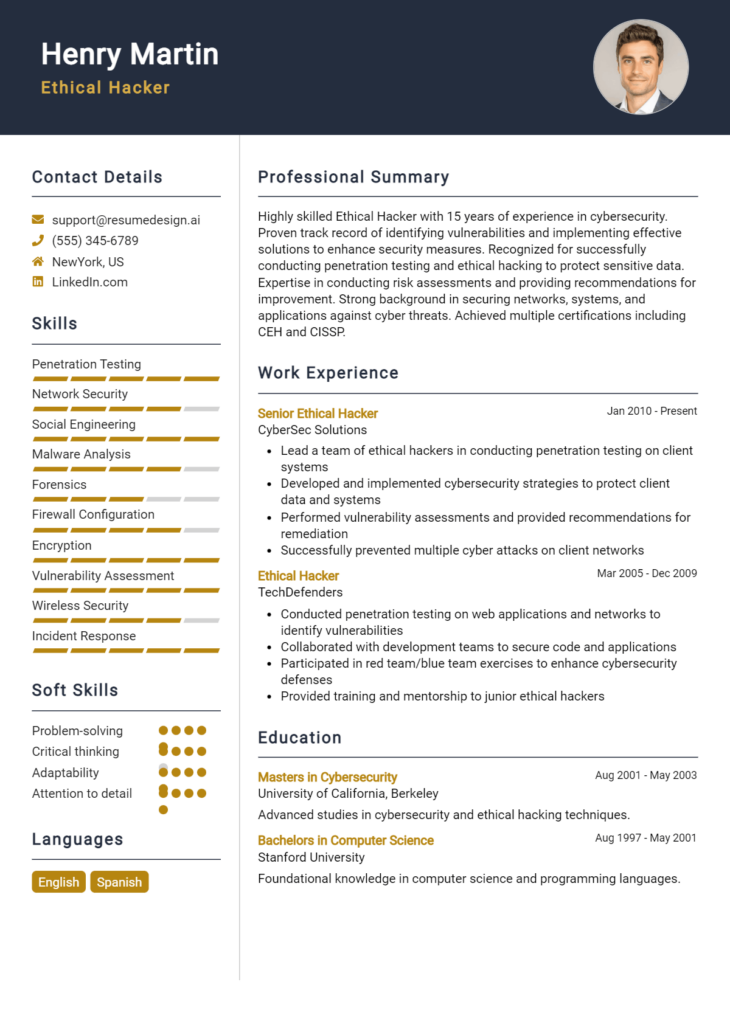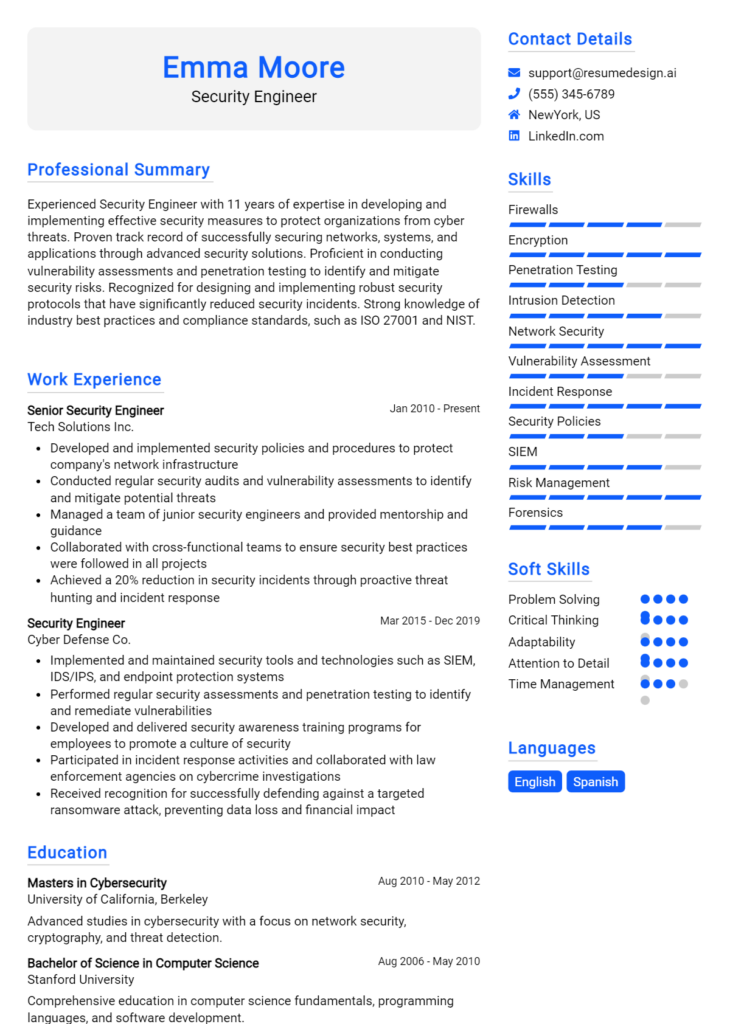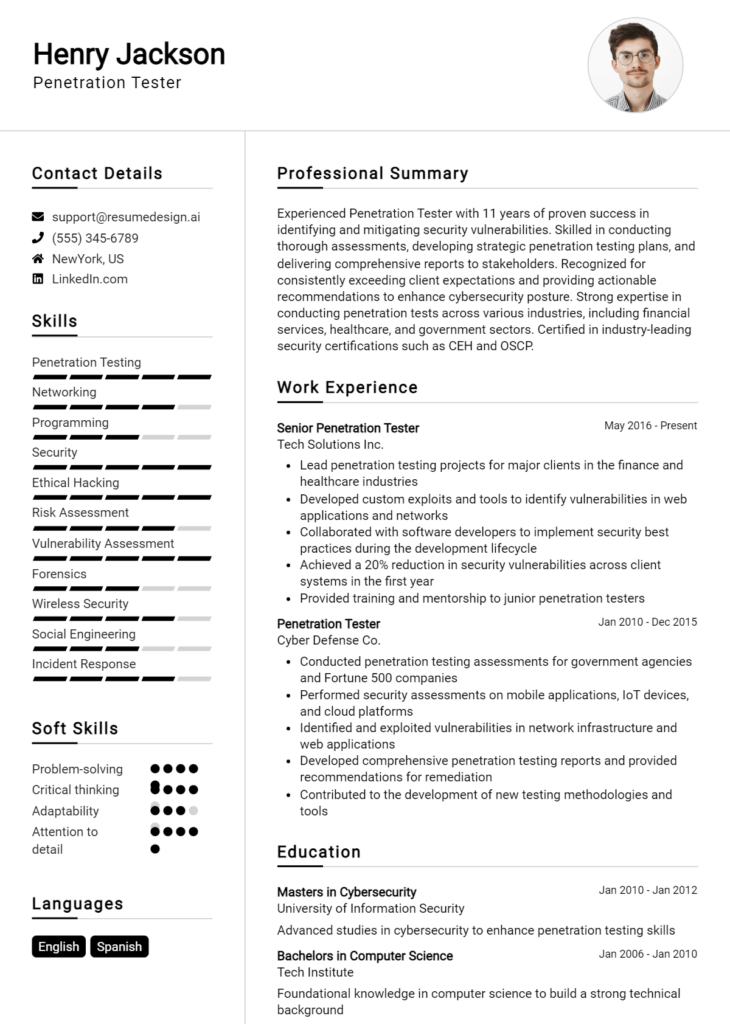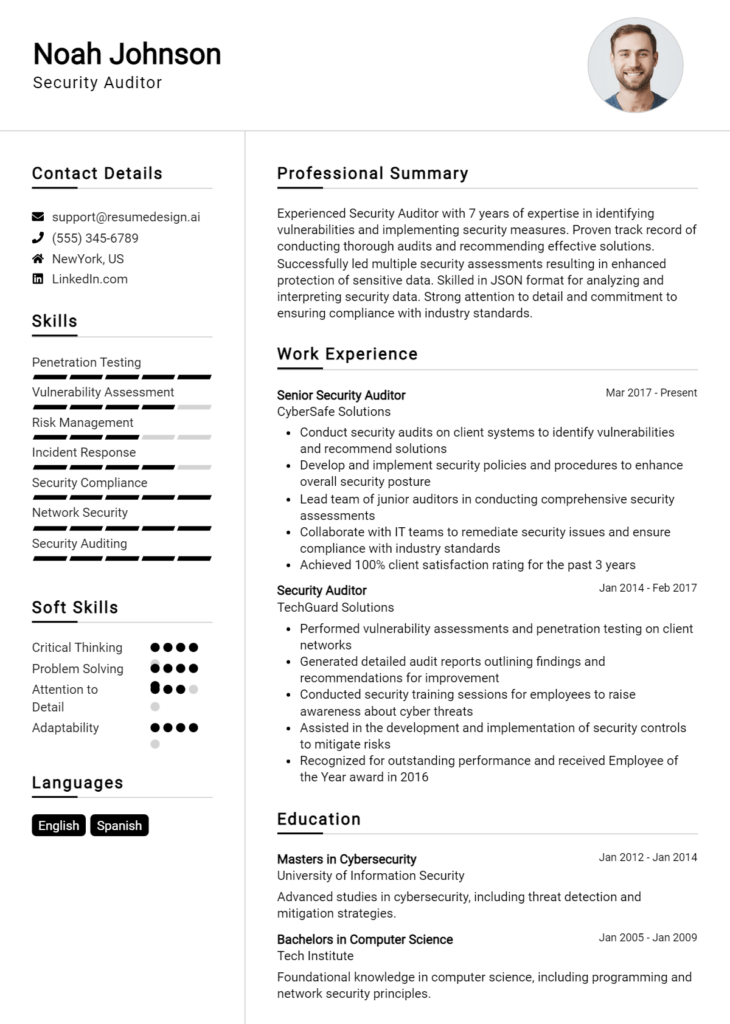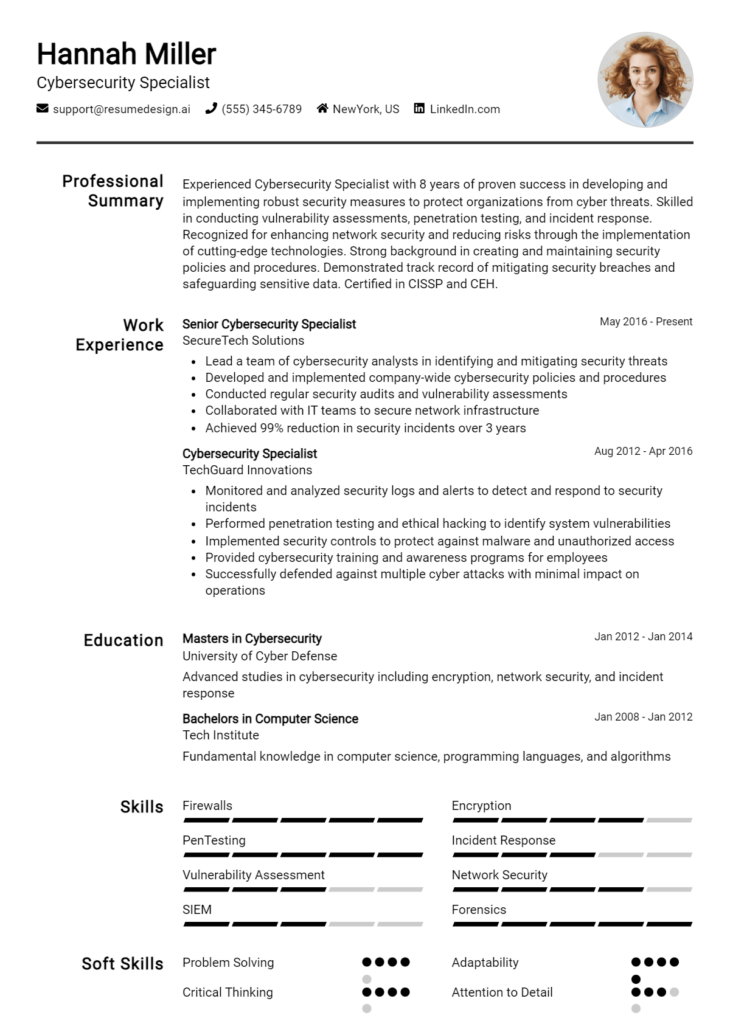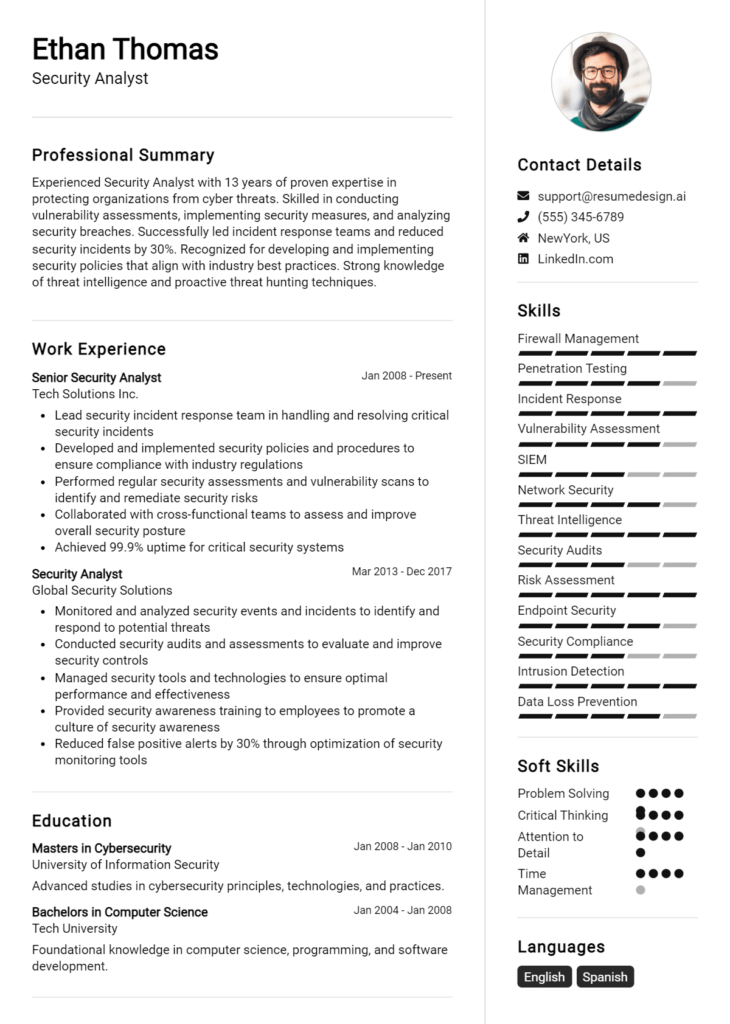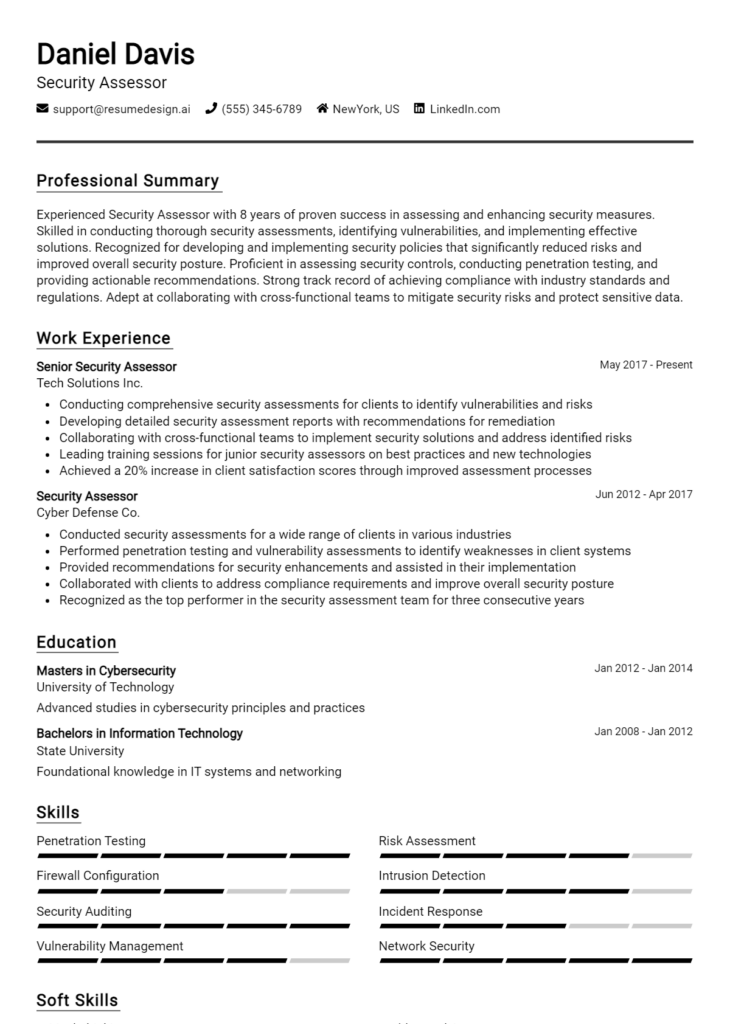Security Vulnerability Manager Core Responsibilities
A Security Vulnerability Manager plays a crucial role in safeguarding an organization's assets by identifying, assessing, and mitigating security vulnerabilities. This position requires strong technical expertise, operational insight, and adept problem-solving skills to collaborate effectively across departments such as IT, compliance, and risk management. By bridging these functions, the professional ensures that security measures align with business objectives. A well-structured resume highlighting these competencies can significantly enhance one's attractiveness to potential employers and contribute to the organization's overall security posture.
Common Responsibilities Listed on Security Vulnerability Manager Resume
- Conduct regular vulnerability assessments and risk analysis.
- Develop and implement security vulnerability management programs.
- Collaborate with IT and development teams to remediate vulnerabilities.
- Monitor and analyze security alerts and incidents.
- Maintain up-to-date knowledge of security threats and trends.
- Prepare and present reports on vulnerability status to stakeholders.
- Coordinate penetration testing and security audits.
- Ensure compliance with industry regulations and standards.
- Develop training programs to raise security awareness.
- Establish and enforce security policies and procedures.
- Manage relationships with external security vendors and partners.
- Evaluate and recommend security tools and technologies.
High-Level Resume Tips for Security Vulnerability Manager Professionals
In today's competitive job market, a well-crafted resume is essential for Security Vulnerability Manager professionals aiming to make a strong first impression on potential employers. Your resume is often the first document a hiring manager reviews, and it needs to effectively showcase your unique skills, relevant experience, and notable achievements in the field of cybersecurity. A compelling resume not only highlights your qualifications but also communicates your understanding of security vulnerabilities and your ability to mitigate risks. This guide will provide practical and actionable resume tips specifically tailored for Security Vulnerability Manager professionals, ensuring that your application stands out in a crowded field.
Top Resume Tips for Security Vulnerability Manager Professionals
- Tailor your resume to the job description by incorporating keywords that match the requirements outlined in the posting.
- Highlight relevant experience in vulnerability assessment, risk management, and incident response to demonstrate your expertise.
- Quantify your achievements by using specific metrics, such as the percentage of vulnerabilities reduced or the number of successful security audits conducted.
- Showcase industry-specific skills, such as familiarity with tools like Nessus, Qualys, or Burp Suite, to prove your technical proficiency.
- Include certifications relevant to the field, such as Certified Information Systems Security Professional (CISSP) or Certified Ethical Hacker (CEH), to enhance credibility.
- Utilize a clean and professional format that enhances readability and presents information logically.
- Incorporate a summary statement at the beginning of your resume that encapsulates your experience and career goals in security management.
- Demonstrate your ability to communicate complex security issues to both technical and non-technical stakeholders.
- Provide examples of your leadership experience, particularly in managing security teams or projects, to illustrate your capability in driving security initiatives.
- Keep your resume concise, ideally one to two pages, to maintain the reader's attention and ensure all crucial information is easily accessible.
By implementing these tips, Security Vulnerability Manager professionals can significantly increase their chances of landing a job in the field. A focused and well-structured resume not only highlights your qualifications but also communicates your passion for cybersecurity and your commitment to protecting organizations from potential threats. Take the time to refine your resume, and you'll be better positioned to secure interviews and advance your career in this critical domain.
Why Resume Headlines & Titles are Important for Security Vulnerability Manager
In the competitive field of cybersecurity, particularly for the role of Security Vulnerability Manager, a well-crafted resume headline or title plays a crucial role in making a strong first impression. A compelling headline can quickly capture the attention of hiring managers by summarizing a candidate's key qualifications in a concise and impactful manner. It serves as a snapshot of your professional identity, helping to convey your expertise, experience, and the value you bring to the organization. By ensuring that the headline is relevant and directly aligned with the job being applied for, candidates increase their chances of standing out in a crowded job market.
Best Practices for Crafting Resume Headlines for Security Vulnerability Manager
- Keep it concise: Aim for a headline that is brief yet informative.
- Be role-specific: Use terminology and keywords relevant to the Security Vulnerability Manager position.
- Highlight key strengths: Focus on your most significant skills or experiences that relate to the job.
- Use action-oriented language: Employ strong verbs to convey your proactive approach.
- Quantify achievements: If possible, include metrics or accomplishments that demonstrate your impact.
- Tailor for each application: Customize your headline for the specific job to which you are applying.
- Avoid jargon: Ensure clarity by avoiding overly technical language that might confuse hiring managers.
- Make it engaging: Use a tone that reflects your enthusiasm for the role and the field of cybersecurity.
Example Resume Headlines for Security Vulnerability Manager
Strong Resume Headlines
Seasoned Security Vulnerability Manager with 10+ Years in Threat Mitigation and Risk Assessment
Proven Leader in Cybersecurity with a Track Record of Reducing Vulnerabilities by 40%
Expert Security Analyst Specializing in Vulnerability Management and Compliance Solutions
Dynamic Security Vulnerability Manager with Extensive Experience in Incident Response and Remediation
Weak Resume Headlines
Security Manager Looking for Job
Cybersecurity Professional
Experienced Individual in Security
The strong headlines are effective because they are specific, quantifiable, and tailored to the job role, immediately conveying the candidate's qualifications and achievements. In contrast, the weak headlines fail to impress as they lack clarity, specificity, and do not highlight any notable skills or experiences. By avoiding generic phrases, candidates can better position themselves as qualified and valuable applicants, enhancing their chances of getting noticed by hiring managers.
Writing an Exceptional Security Vulnerability Manager Resume Summary
A resume summary is a critical component for a Security Vulnerability Manager, as it serves as a concise introduction to your professional identity and qualifications. In a competitive job market, hiring managers often skim through resumes, making it essential to have a strong summary that quickly captures their attention. A well-crafted summary effectively showcases key skills, relevant experience, and notable accomplishments that align with the job role, all while remaining succinct and impactful. Tailoring the summary to the specific position not only demonstrates your understanding of the role but also highlights your suitability for the job, making it a vital element in your resume.
Best Practices for Writing a Security Vulnerability Manager Resume Summary
- Quantify achievements: Use specific metrics to demonstrate your impact, such as reduced vulnerabilities by a certain percentage or improved response times.
- Focus on relevant skills: Highlight key skills that are directly related to the job description, such as risk assessment, threat analysis, and compliance management.
- Tailor the summary: Customize your summary for each job application, incorporating keywords from the job description to align with the employer's needs.
- Be concise: Aim for 3-5 sentences that deliver a powerful message without overwhelming the reader.
- Showcase industry experience: Mention specific sectors you have worked in, such as finance, healthcare, or technology, to underline your expertise.
- Highlight certifications: If applicable, include relevant certifications like CISSP, CISM, or CEH to bolster your qualifications.
- Demonstrate leadership: If you have managed teams or projects, emphasize your leadership skills and ability to drive security initiatives.
- Include soft skills: Mention essential soft skills such as communication, problem-solving, and teamwork, which are critical in a security-focused role.
Example Security Vulnerability Manager Resume Summaries
Strong Resume Summaries
Results-driven Security Vulnerability Manager with over 8 years of experience in identifying and mitigating security risks in financial institutions. Successfully reduced vulnerabilities by 30% through the implementation of a comprehensive risk assessment framework and advanced threat detection tools.
Dedicated Security Vulnerability Manager with expertise in compliance and risk management, complemented by CISSP certification. Led a cross-functional team to enhance security protocols, achieving a 50% decrease in incident response time and ensuring 100% compliance with regulatory standards.
Accomplished Security Vulnerability Manager with a proven track record of conducting thorough penetration tests and vulnerability assessments. Improved the organization’s security posture by implementing remediation strategies that decreased exploitable vulnerabilities by 40% within one year.
Weak Resume Summaries
Security professional with experience in various roles. I am looking for a position where I can use my skills.
A motivated individual interested in security management. I have worked in IT and want to help organizations with their security needs.
The examples provided illustrate the distinction between strong and weak resume summaries. Strong summaries are impactful, quantifying achievements and showcasing relevant skills and experiences that directly align with the role of a Security Vulnerability Manager. In contrast, weak summaries lack specificity, fail to highlight measurable outcomes, and come off as generic, which diminishes their effectiveness in capturing the attention of hiring managers.
Work Experience Section for Security Vulnerability Manager Resume
The work experience section of a Security Vulnerability Manager resume is crucial in demonstrating a candidate's technical proficiency and leadership capabilities. It serves as a platform to showcase not only the ability to identify and mitigate security vulnerabilities but also the capacity to manage teams effectively and deliver high-quality, secure products. By quantifying achievements and aligning experiences with industry standards, candidates can illustrate their impact and contributions to previous organizations, making a compelling case for their expertise in the field.
Best Practices for Security Vulnerability Manager Work Experience
- Highlight specific technical skills, such as proficiency in vulnerability assessment tools and methodologies.
- Quantify achievements with metrics, such as percentage reductions in vulnerabilities or improved response times.
- Emphasize leadership roles, detailing experiences in managing and mentoring security teams.
- Showcase collaboration with cross-functional teams, including IT, development, and compliance departments.
- Include certifications and training relevant to vulnerability management and cybersecurity.
- Align experiences with industry standards and frameworks, such as NIST, ISO, or OWASP.
- Use action verbs to convey a proactive approach and initiative in past roles.
- Focus on the impact of your contributions, demonstrating how you improved security posture or reduced risk.
Example Work Experiences for Security Vulnerability Manager
Strong Experiences
- Led a team of 10 security analysts in conducting vulnerability assessments, reducing critical vulnerabilities by 40% within a year.
- Implemented a new vulnerability management program that decreased remediation time from 30 days to 10 days, enhancing overall security posture.
- Collaborated with development teams to integrate security best practices into the software development lifecycle, resulting in a 25% decrease in vulnerabilities in production.
- Designed and executed a comprehensive training program for IT staff on vulnerability management tools, increasing tool utilization by 60%.
Weak Experiences
- Worked on various security-related tasks in a team setting.
- Helped manage vulnerabilities without specific achievements or metrics.
- Participated in meetings to discuss security issues.
- Assisted in the implementation of security measures with no clear impact described.
The examples provided reflect strong experiences as they demonstrate clear, quantifiable outcomes, leadership qualities, and effective collaboration, showcasing the candidate's impact in previous roles. In contrast, the weak experiences lack specific achievements, metrics, and clarity, making it difficult to ascertain the candidate's contributions or skills. A strong work experience section is vital for standing out in the competitive field of security vulnerability management.
Education and Certifications Section for Security Vulnerability Manager Resume
The education and certifications section of a Security Vulnerability Manager resume plays a crucial role in showcasing a candidate's academic background and their dedication to ongoing professional development. This section not only outlines the foundational knowledge gained through formal education but also highlights industry-relevant certifications that validate the candidate’s expertise in security practices. By providing details about relevant coursework, recognized certifications, and specialized training programs, candidates can significantly enhance their credibility and demonstrate alignment with the responsibilities of a Security Vulnerability Manager. This strategic presentation of qualifications can set a candidate apart in a competitive job market.
Best Practices for Security Vulnerability Manager Education and Certifications
- Focus on relevant degrees such as Computer Science, Information Technology, or Cybersecurity.
- Include industry-recognized certifications like CISSP, CISM, or CEH to demonstrate specialized knowledge.
- Detail relevant coursework that aligns with vulnerability management, such as Secure Software Development or Risk Management.
- Highlight any advanced degrees, such as a Master's in Cybersecurity, to indicate advanced knowledge and skills.
- Keep the section concise, focusing on the most impactful and relevant qualifications.
- Update certifications regularly to reflect ongoing education and commitment to staying current in the field.
- Include specialized training programs that enhance specific skills related to vulnerability assessment and management.
- Use clear formatting to enhance readability, such as bullet points and consistent date formats.
Example Education and Certifications for Security Vulnerability Manager
Strong Examples
- Bachelor of Science in Cybersecurity, XYZ University, 2018
- Certified Information Systems Security Professional (CISSP), 2022
- Certified Ethical Hacker (CEH), 2021
- Advanced Certificate in Vulnerability Assessment from ABC Training Institute, 2023
Weak Examples
- Bachelor of Arts in History, ABC College, 2010
- CompTIA A+ Certification, 2015
- Basic Computer Literacy Course, 2019
- High School Diploma, 2008
The strong examples are considered effective as they directly relate to the key competencies and knowledge areas required for a Security Vulnerability Manager role, showcasing relevant degrees and certifications that signify advanced expertise. In contrast, the weak examples are less effective, as they include outdated or irrelevant qualifications that do not demonstrate the necessary skills for the position, ultimately failing to align with the expectations of the role.
Top Skills & Keywords for Security Vulnerability Manager Resume
In the ever-evolving landscape of cybersecurity, the role of a Security Vulnerability Manager is critical in safeguarding an organization’s digital assets. A well-crafted resume that highlights pertinent skills is essential for candidates aspiring to excel in this position. Employers seek individuals who not only possess technical expertise but also demonstrate strong interpersonal abilities to effectively communicate vulnerabilities and collaborate with various teams. By showcasing a balanced mix of hard and soft skills, candidates can better illustrate their qualifications and readiness to tackle the challenges associated with security vulnerabilities.
Top Hard & Soft Skills for Security Vulnerability Manager
Soft Skills
- Effective Communication
- Team Collaboration
- Problem-Solving
- Critical Thinking
- Attention to Detail
- Leadership
- Time Management
- Adaptability
- Conflict Resolution
- Stakeholder Engagement
- Strategic Planning
- Empathy
- Analytical Skills
- Decision-Making
Hard Skills
- Vulnerability Assessment Tools (e.g., Nessus, Qualys)
- Risk Management Frameworks (e.g., NIST, ISO)
- Penetration Testing
- Incident Response Planning
- Security Information and Event Management (SIEM)
- Threat Modeling
- Cybersecurity Frameworks (e.g., CIS, MITRE ATT&CK)
- Compliance Standards (e.g., GDPR, HIPAA)
- Network Security Protocols
- Firewall and Intrusion Detection Systems (IDS)
- Programming/Scripting Languages (e.g., Python, Bash)
- Data Encryption Technologies
- Cloud Security Practices
- Security Auditing and Compliance
- Operating Systems Security (e.g., Linux, Windows)
- Vulnerability Management Lifecycle
- Security Risk Assessment
For more information on enhancing your resume with the right skills and detailing your work experience, be sure to explore the resources available to you.
Stand Out with a Winning Security Vulnerability Manager Cover Letter
I am excited to apply for the Security Vulnerability Manager position at [Company Name]. With a robust background in cybersecurity, extensive experience in vulnerability management, and a proven track record of developing and implementing effective security protocols, I am confident in my ability to contribute to your team and enhance your organization’s security posture. In my previous role at [Previous Company Name], I led a team of security analysts to identify, assess, and remediate vulnerabilities across a diverse IT environment, ensuring compliance with industry standards and best practices.
My approach to vulnerability management is both proactive and strategic. I believe in fostering a culture of security awareness within the organization, which involves not only identifying and mitigating risks but also educating stakeholders on the importance of cybersecurity. At [Previous Company Name], I implemented a comprehensive training program that improved awareness and participation in security initiatives, resulting in a 30% reduction in vulnerability incidents over a year. I am adept at utilizing various tools and technologies, such as vulnerability scanners and threat intelligence platforms, to streamline the identification and prioritization of threats.
In addition to my technical skills, I have a strong ability to communicate complex security concepts to both technical and non-technical audiences. I have collaborated closely with cross-functional teams to ensure that security measures align with business objectives while maintaining compliance with regulatory requirements. My experience in managing incident response initiatives has equipped me with the skills necessary to handle high-pressure situations effectively, ensuring timely resolution and minimal impact to the organization.
I am particularly drawn to [Company Name] because of your commitment to innovation and excellence in cybersecurity. I am eager to bring my expertise in vulnerability management and my passion for protecting organizational assets to your team. Thank you for considering my application. I look forward to the opportunity to discuss how my skills and experiences align with the needs of your organization.
Common Mistakes to Avoid in a Security Vulnerability Manager Resume
When crafting a resume for the role of Security Vulnerability Manager, it's essential to present a polished and professional document that highlights relevant skills and experiences. However, many candidates make critical mistakes that can undermine their chances of landing an interview. Understanding these common pitfalls can help you refine your resume and showcase your qualifications effectively.
Vague Job Descriptions: Failing to provide specific examples of past responsibilities can make it difficult for hiring managers to gauge your expertise. Use clear, detailed descriptions that highlight your contributions to security initiatives.
Ignoring Relevant Certifications: Not mentioning relevant certifications such as CISSP, CEH, or CISM can be a significant oversight. These credentials demonstrate your commitment and knowledge in the field of security.
Overly Technical Jargon: While it's important to demonstrate technical knowledge, using excessive jargon can alienate hiring managers who may not be as familiar with specific terms. Aim for a balance between technical language and clear communication.
Lack of Quantifiable Achievements: Failing to include measurable accomplishments, such as reduced vulnerabilities by a certain percentage or successful audits, can make your contributions seem less impactful. Quantify your achievements to provide concrete evidence of your capabilities.
Neglecting Soft Skills: Security Vulnerability Managers must possess strong communication and leadership skills. Omitting these attributes can give the impression that you are solely focused on technical aspects, rather than being a well-rounded candidate.
Formatting Issues: A cluttered or inconsistent format can distract from your qualifications. Ensure your resume is clean, organized, and easy to read, with consistent font usage and bullet points.
Not Tailoring the Resume: Sending out a generic resume without tailoring it to the specific job description can lower your chances of success. Customize your resume to reflect the requirements and responsibilities listed in the job posting.
Overlooking Keywords: Many employers use applicant tracking systems (ATS) to screen resumes. Failing to include relevant keywords from the job description can result in your resume being filtered out before it reaches a human reviewer.
Conclusion
As a Security Vulnerability Manager, your role is critical in safeguarding an organization's digital assets by identifying, assessing, and mitigating security risks. Key responsibilities often include conducting vulnerability assessments, managing remediation efforts, and ensuring compliance with industry standards. You must stay abreast of emerging threats and lead initiatives to bolster security posture.
In summary, the importance of having an impactful resume cannot be overstated. Tailoring your resume to highlight your skills in risk management, incident response, and familiarity with security tools will set you apart in a competitive job market. It’s essential to showcase not only your technical expertise but also your leadership and communication skills, as these are vital for collaboration across various departments.
To enhance your job application, consider reviewing your Security Vulnerability Manager resume to ensure it accurately reflects your qualifications and achievements. Utilize available resources like resume templates, a resume builder, and resume examples to create a polished and professional document. Additionally, don’t forget to craft a compelling cover letter using cover letter templates that can introduce your capabilities and passion for the role effectively.
Take action today—revamp your resume and cover letter to increase your chances of landing your next role as a Security Vulnerability Manager!

